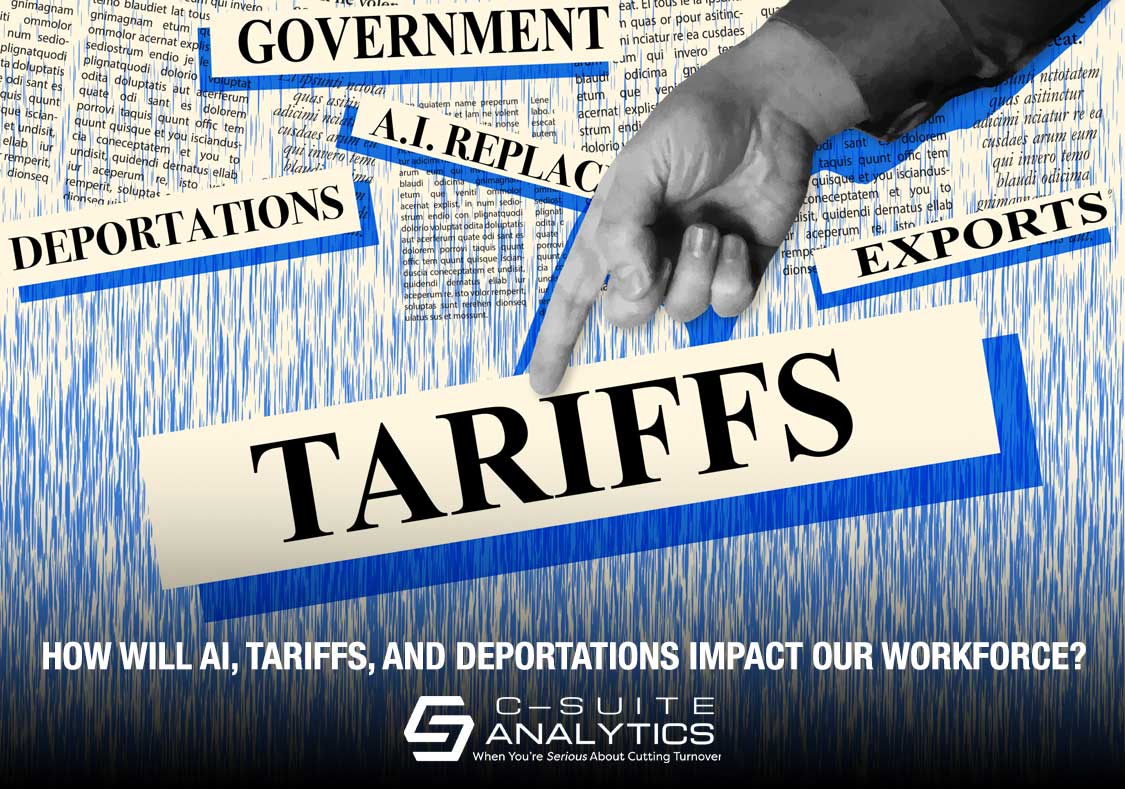AI, deportations, tariffs, and birthrate declines are reshaping America's workforce—blue- and white-collar alike. From baby boomer exits to AI disruptions, breaking down the workforce challenges no leader can afford to ignore.
Are Employees Quitting Because of Pay?

The most recent quits data from our Bureau of Labor Statistics is startling. About 2.9% of our workforce quit in August, equating to 4.3 million workers. Annualized this means 35% of the U.S. workforce will walk off their jobs in 2021, more than one-third of all workers. Here are just a few industry numbers for that month:
- 892,000 from restaurants, bars, and hotels
- 721,000 from retail
- 706,000 from professional business services
- 534,000 from healthcare and social assistance
The data doesn’t tell us why people quit, just that they quit. Making this worse, the labor market is still down five million jobs since before the pandemic. So the math tells us MORE workers are quitting FEWER jobs.
The worse news is this problem might never go away. Of 52 economists surveyed by The Wall Street Journal, 22 predicted that workforce participation would never return to its pre-pandemic level.[i] That same report detailed a partial list of companies trying to hire thousands of workers for the near-approaching holiday season…Amazon and Walmart are seeking 300,000 workers between them while UPS and FedEx are hoping to hire nearly 200,000 package handlers and other workers. How will that work out?
More evidence is that television commercials for major job-posting sites have switched from seeking more companies to seeking more applicants. Enough employers are pumping large sums of money into Indeed and similar sites that Indeed itself is seeking more applicants. It’s the workers who are missing.
Then comes along the usually-great phenomenon that our governments want to create MORE jobs…at a time when we can’t find enough workers to fill the current ones. How many times can we say “unprecedented”?
Our Comprehensive Turnover Solution is designed to get results for companies like yours by cutting turnover 30% and more and implementing Stay Interviews the right way is key to this. Write me or connect with me if you want to learn more…DFinnegan@C-SuiteAnalytics.com.
Let’s turn our attention to is pay more important for attracting workers than for retaining them…by contrasting how workers perceive their jobs before hire and after hire.
When offered a job we know the pay, benefits, schedule, location, the broad job duties, and we’ve likely had an interview with our potential boss. And the most tangible job component we know…and one we use when comparing one job offer to another…is pay. Our own work experiences remind us that getting pay increases isn’t easy so why start at a lower point?
And when we consider leaving a job, we know all of those same things…pay, benefits, schedule, location…plus (1) deeper knowledge of our job duties, (2) a profound, evidence-based opinion of our boss, and (3) the value of relationships we’ve built with our colleagues.
So what’s different in our perspectives when taking a job vs thinking of leaving one? The answer is we know exponentially more about our boss, colleagues, and our job duties. These are the precise job components that build glue for staying or break bonds for leaving. Do employees leave jobs for an extra $1.00 per hour when they feel positively about their supervisor, their peers, and the daily duties of their jobs? I’ve seen no evidence that says they do.
When does an extra $1.00 per hour matter? Perhaps when deciding whether to accept a job, but only when all other factors are equal. And an extra $1.00 per hour matters once we’ve been on the job and go home from work feeling offended, disparaged, and under-appreciated by one’s boss. Or just feeling no glue, feeling distant, with no personal connections at work that make us want to stay.
We often site the Kenexa global study where employees who had voluntarily quit jobs were surveyed on how they felt about their pay, benefits, development, advancement, and their bosses. The outcome was that all responses were “mediated” or impacted by how these employees felt about their bosses. Or said another way, the more employees like their supervisors the more they like their pay, benefits, and more. Would job-seekers choose one job over another for $1.00 an hour? Maybe. Would they leave a job they liked for $1.00 an hour? Probably not. Would they leave a job for an extra $5.00 an hour? More likely yes, but it depends on how they feel about their boss.
[i] https://www.wsj.com/articles/labor-shortage-missing-workers-jobs-pay-raises-economy-11634224519



